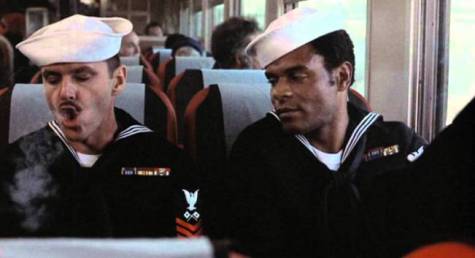
 Hal Ashby’s film about two navy men assigned to escort a young sailor to the brig, is an example of how gritty, downbeat films could be made, and seen by a wide audience, in the 1970s.
Hal Ashby’s film about two navy men assigned to escort a young sailor to the brig, is an example of how gritty, downbeat films could be made, and seen by a wide audience, in the 1970s.
In that brief period of gritty, down-to-earth American filmmaking known as the early 1970s, new writers and directors sought to portray our national life without resorting to the populist clichés of traditional Hollywood. One of the unusual results was The Last Detail, released in 1973, adapted from a Darryl Ponicsan novel by Robert Towne and directed by Hal Ashby. A downbeat film of working class realism, you might expect it to fail at the box office, but it was a success both financially and critically, and I think this says something about the United States at that time.
At the Norfolk, Virginia naval base, a young sailor named Meadows, played by Randy Quaid in his very first role, is caught stealing 40 bucks from a polio donation can. This is the wife of the base commander’s pet charity, so Meadows gets the book thrown at him—eight years in the brig. Two men are assigned to transport the prisoner from Virginia to the military prison in New Hampshire: Signalman 1st class “Bad Ass” Buddusky, played by Jack Nicholson, and Gunner’s Mate “Mule” Mulhall, played by Otis Young. On the way, these two quickly realize that Meadows is a naïve and innocent kid, who’s never had sex, or even been drunk before. So instead of going straight to the prison, they go on partying sprees in Washington, New York, and Boston.
If the film were made nowadays, it would probably try to sustain a mood of goofy hijinks. But Ashby lets his actors behave naturally, and the scenes move along at a pace more in tune with these kinds of characters, people who are trying to stretch a grim duty into a semblance of fun. Quaid is remarkable as a lost soul only now experiencing the world. Young plays Mulhall with alternating bouts of weary amusement and annoyance at the antics of his mate Buddusky. But it’s Jack Nicholson as Buddusky that makes the movie work. He had just reached stardom with his supporting role in Easy Rider, and then his great leading role in Five Easy Pieces. Later in his career he would sometimes play off on his public persona, but at this point he hadn’t yet established those mannerisms. Buddusky isn’t your typical Jack Nicholson character. He’s short and cocky, like a little rooster, a bit of a liar and a braggart, but also a wise guy and funny as hell. Buddusky wants to show the kid, Meadows, a good time, and on this subject he sometimes clashes with Mulhall, who is more realistic about things. When Nicholson gets in a zone here, it’s both amazingly realistic and hilarious. A long sequence in a cheap hotel room where the three guys get more and more drunk, and Nicholson keeps going off on rants about one thing or another, made me laugh a lot.
These aren’t macho action hero types. They remind me of men that I’ve known. The same bravado, but also the same fear and loneliness, creeping around the edges. As the journey goes on, the film goes deeper. Meadows’ plight is really the plight of the other two in a different key. The sense of being trapped by people and things that have unwanted authority over you. The struggle to keep your head above water in an increasingly indifferent environment. And ultimately the sorrow of knowing they have to give up this poor kid to prison and return to their base. The Last Detail was released in a year when Vietnam was winding down, Watergate was beginning, and a lot of people had become angry and disillusioned. The film reflected that reality in a blunt and honest, but not preachy way. To me, 44 years later, it seems very relevant again.

